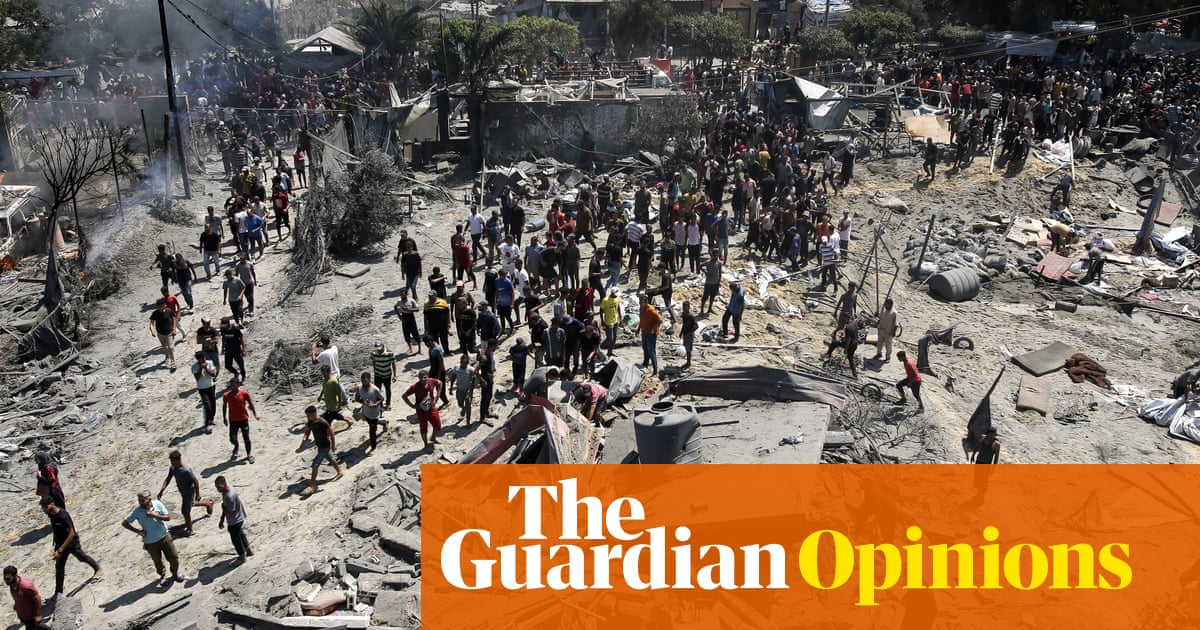On Tuesday, the British government will be in the high court defending the indefensible: its continuing approval of arms exports toIsrael. As the government’s lawyers take the floor to deliver their opening remarks – in a case that was brought by the Palestinian human rights group Al-Haq and is supported by Human Rights Watch – thousands of children in Gaza will be starving. This is the result of an Israeli blockade on food, aid and medical supplies that defies the binding orders of the international court of justice.
Thousands of mothers will be mourning the children they have lost in an assault on Gaza that is estimated to have cost the lives ofmore than 50,000 people, according to the Gaza ministry of health. Thousands of people will be homeless,forcibly displacedand living among the rubble of the towns and cities they no longer recognise.
Israel is committing widespread and systematic violations of international law. This is plain to see. Organisations like my own have documented how the Israeli government iscommittingan array of atrocity crimes against Palestinians in Gaza,includingacts of genocide and the crime against humanity of extermination. An independentUN inquiryhas found the same.
Under British and international law, arms licensing should be suspended if there is a “clear risk” that arms might be used to commit or facilitate serious violations of international humanitarian law. That threshold hasn’t just been crossed, it has been bulldozed.
Last September, the governmentadmittedthe threshold has been crossed and halted about 30 export licences for military equipment that is used by the Israeli army in Gaza. But it left one critical loophole: F-35 fighter jet components that go into a globalF-35 supply programme,which isoverseenby the US, that Israel sources parts from.Fifteen per centof the F35 fighter jet – arguably the most lethal UK export used by Israeli forces in Gaza – is manufactured in the UK. It is reported that an F-35 was used in astrike on al-Mawasi, a designated safe zone, where Israeli forces dropped at least three 2,000lb bombs, apparently killing 90 people, including women and children.
So if Keir Starmer, the prime minister, accepts that this critical legal threshold has been met, how can the government stand up in court and justify this breach of international law? Well, the government argues that the obligation to avoid selling arms that will be used in potential war crimes does not apply in this context because the F-35 programme iscrucial to ensuringglobal “peace and security”. What this means in practice is still unclear, but one component of delivering global peace and security, exposed during the last court hearing, appears to be that the UK doesn’t want a foreign policy at odds with the United States. According to documents submitted in evidence, upholding its obligations “would undermine US confidence in the UK and Nato at a critical juncture in our collective history and set back relations”.
This argument is highly dangerous. It would allow states to flout their international obligations simply in order to appease an ally; and it risks running a coach and horses through the international arms control framework, including the UN arms trade treaty (ATT), which the UK ratified in 2014. It will have far-reaching consequences for the lives of people in Gaza and risks the conflict there becoming a blueprint for other armed conflicts, where international law is treated as optional and relationships with a powerful ally considered paramount. This is dangerous in any context but withDonald Trumpat the helm in the White House, it borders on the grotesquely absurd.
Trump has aggressively attacked vital organs of justice and order such as the international criminal court (ICC) and the UN, often in defence of Israel, including byauthorising a sanctions programmethat targets the critical work of the ICC,withdrawing the USfrom the UN’s human rights council, and proposing to slash funding to the numerous UN programmes and institutions. His administration hassanctionedthe mass deportation and imprisonment of immigrants without respect for their due process rights.
In the context of current hostilities in Gaza, Trump has further entrenched and hardenedJoe Biden’s approach, deepeningUS complicityin Israeli atrocities. Trump hassupportedthe ethnic cleansing and forced displacement of Palestinians in Gaza, supported the campaign to liquidate the UN relief works agency for Palestine refugees in the near east (Unrwa), the main UN aid agency for Palestinian refugees. He hasencouragedIsrael to break the ceasefire,reverseda halt on the supply to Israel of the devastating 2,000lb bombs,lifted sanctionson violent actors in the West Bank, andthreatensforeign nationals who criticise Israel in the US with deportation. It is unsurprising that repression of Palestinians, settler violence and land seizures in the occupied West Bank have spiked since he took office.
It is time for the UK to re-evaluate the so-called “special relationship” with the US and take a stand. Abandoning its legal defence of licensing F-35 fighter jet components to the global programme is the legal and moral thing to do, it is the humane thing to do, and it is also the popular thing to do, with polling showing that amajority of Britonssupport a suspension of arms exports to Israel. At a time of incredible uncertainty and geopolitical upheaval, Britain needs to stand up for and be committed to international law – even if it upsets Donald Trump.
Yasmine Ahmed is UK director of Human Rights Watch
Do you have an opinion on the issues raised in this article? If you would like to submit a response of up to 300 words by email to be considered for publication in ourletterssection, pleaseclick here.
